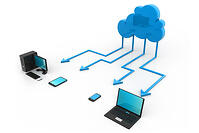 "The Cloud" It seems like these words strike either confusion or fear into people's hearts. People ask me all the time, "should we be in the cloud?"
"The Cloud" It seems like these words strike either confusion or fear into people's hearts. People ask me all the time, "should we be in the cloud?"
Most of the time, I carefully and calmly let them know that they probably already are in the cloud - they just don't know it. If you're using a service like Dropbox, Netflix, Hulu, Flickr, Google Mail, Yahoo Mail, or iCloud - guess what? You're in the cloud.
Now a days, The Cloud, simply put, refers to any software, service, or data that you can access via the internet and via multiple devices. Most people think the cloud has to mean some huge data center with gobs and gobs of storage.
The fact is, many companies now are running their own "private" clouds. Ie: their information is accessible anywhere at any time via any device. There are clearly different varieties of the cloud, and differing degrees to the extent a business is "in the cloud". But, this is generally the agreed upon definition of what The Cloud means.
There are many advantages to using the Cloud. Since the videos, photos, documents, games and other software that lives in the cloud are available on any device with an Internet connection, you can access your stuff from anywhere.
The cloud lets you watch parts of "Orange is the new Black" on your phone and then pick it up in the exact same location on your computer at home. You can purchase something on iTunes and then have it available on all of your devices. You can get your office email on your iPhone, tablet, or computer. All because of the Cloud.
Besides your personal use of the cloud, something you should be aware of is there's also a ton of your personal information stored in the cloud that you didn't create. Health care providers store your medical records in the cloud.
Insurance companies and banks store your information there. And don’t forget that friends post photos of you on Facebook and Instagram.
It's great when you want to access it, but it’s also a bit scary when you don't want others to. On top of this, there's a whole new concept called "Big Data". This is where companies, called Data Brokers, are farming all of your actions, interests, browsing habits, and information they can get their hands on and merging it all together into one big database all about you.
Because the Cloud makes getting to all sorts of information easier, it’s now easier to build these dossiers on everyone (Side Bar: you have to check out this 60 Minutes story on Data Brokers).
So, now that you know a little bit more about the cloud the next logical question is - Is it safe? Well, that's hard to say. It depends. Sometimes yes, and sometimes no. Recently it seems that security of our data has become less of an issue but only because we're lowering our threshold around the concept of privacy (this is a topic for another blog).
Most cloud companies have excellent security records. But, more and more it’s becoming increasingly clear that it’s not a matter of IF a cloud host will be hacked but WHEN.
For certain industries (like our favorites – Investment Advisors and CPA’s), this is becoming an increasingly difficult path to navigate due to their inherent compliance requirements.
You can run from the cloud -- but it's becoming increasingly difficult to hide. Your job might require you to log onto cloud-based software. Microsoft's next version of Windows is expected to run some features of its operating system in the cloud. "The Cloud" may be a nebulous term (no pun intended), but it is becoming an increasingly everyday part of our lives.
/fpa-logo-tagline.gif)





